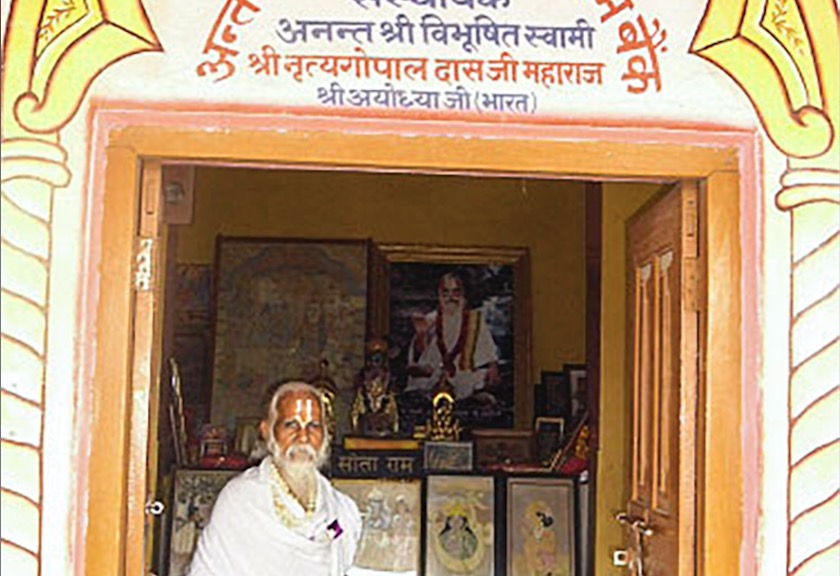WORSHIP
BANKING ON LORD RAMA
______________________
Why this unique “deposit-only” bank is cherished by thousands of devotees
______________________
BY RAJESH SAHAY, NEW DELHI
IMAGINE A BANK THAT ACCEPTS Deposits from its account holders, credits their accounts but never allows them to withdraw anything. That may sound like a bank that few would invest in. However, there is such a bank. It doesn’t accept cash, but rather sheets and sheets of “Sitaram” mantras, penned again and again by devotees who expect their returns from Lord Rama Himself. It is the International Sri Sitaram Naam Bank, headquartered at the Maniram Ki Chhavni temple in Ayodhya, Uttar Pradesh. The bank was founded by Sri Nritygopaldasji Maharaj in the 1970s, and over the years has spread throughout India and to a number of overseas countries, including Nepal, Italy, Germany, China, Saudi Arabia, the UAE, Canada, England and the US. It presently has some 112 branches, with more than 35,000 account holders and a total capital reserve of 130 billion “Sitaram” in its vaults.
During my visit to Ayodhya in August, 2015, I met Sri Nritygopaldasji. He said the bank’s objective is to propagate the bhakti of Lord Rama all over the world by utilizing the leisure time of devotees for a religious purpose, instead of whiling it away in gossip. It strengthens faith and brings great happiness.
The main office of the bank is located on the first floor of the Valmiki Temple, opposite Maniram Ki Chhavni Temple. When I dropped in for a visit, I was surprised to find that the bank had a manager, Sri Punit Ram Dasji, and a cashier on its roll, just like any other bank. They scrupulously maintain ledgers of account holders and a record of overall deposits. Their office is not computerized; its ledgers are in thick hardbound registers, stacked on shelves behind the manager’s desk. On this day a number of devotees were standing in queue to have new deposits recorded in their individual passbook, as well as the master ledger.
The initial minimum deposit to open an account, according to Punit Ram, is 500,000 “Sitaram.” Once an account is opened, subsequent deposits are accepted in multiples of 100,000. Joint accounts can also be opened by two or more devotees. The bank will provide paper and pen free of cost, but devotees usually use their own stationery.
PHOTOS: RAJESH SAHAY
A bank like no other: Manager Punit Ram Dasji stands in front the bank entrance;
“At the beginning of the exercise, the devotee should write (once only) the mantra Om Sri Sita Lakshman bharata shatrughna hanumat sameta Sri Rama Chandra Parbrahmane namah, informed the manager. “As one writes, they should also utter ‘Sitaram’ in silence to help in concentration upon the Lord.” Each devotee is expected to eventually deposit at least 8,400,000 repetitions, which is equal to the number of species of life on Earth, according to some Hindu scriptures. Devotees are expected to write at least one page every day. The cashier, Sri Keshav Das ji, informed me that deposits are accepted in all of India’s languages and even in foreign languages. He showed me sheets in Tamil, Telugu, Kannada, Malyalam, Urdu, Hindi and English. Some devotees have written in calligraphy and some have even used grains of pulses and rice. I was amazed to see the devotion of people taking so much time to write the name of their beloved Lord.
The deposited writings are stored neatly tied in red cloth and kept in an inner room of the temple, the bank’s equivalent of a vault. Here they are worshiped every day.
In talking to a number of account holders, I found that many had come from far-off places, like Madhya Pradesh, Bihar, Chhattisgarh, Rajasthan and Jharkhand. Braj Raj Kishore informed me that writing “Sitaram” gives him immense satisfaction. Now retired as District Engineer from Biharshariff in Bihar, he finds it a pleasurable pastime, keeping him focused upon God. He reminded me of Mahatma Gandhi’s statement that repeating Rama’s name from the heart is capable of removing all pain.
Pages of “Sitaram” writings scribed in Kannada, English and Tamil
